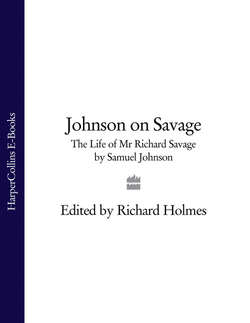Читать книгу Johnson on Savage: The Life of Mr Richard Savage by Samuel Johnson - Samuel Johnson - Страница 7
3
ОглавлениеJohnson took about 3 months compiling and expanding the biography, between mid-September and 14 December 1743, when he signed a receipt for 15 guineas on delivery of the manuscript to Cave. In January 1744, in a deadline crisis familiar to many biographers, he ‘sat up all night’ correcting and revising the last ‘forty-eight pages of the printed octavo’, probably because he had just received copies of Savage’s last three letters from Bristol. The Life was finally published in February 1744.
During this time he sent several notes to his editor, many of them giving painful glimpses of the Grub Street writer’s life which he had shared with Savage. Once, the printer’s boy finds Johnson ‘writing this, almost in the dark’ because he lacks candles. Later he is writing hard but lacks ‘good Pens’. Then he has been ill, the writing has been interrupted, but he is ‘almost well again’ and so humbly begs ‘another Guinea’ in advance. Finally, most bleakly of all, he is ‘impransus’- supperless. Meanwhile he bombards Cave with requests for further information. ‘Towards Mr Savage’s Life what more have you got?’ He asks for a transcript of Savage’s trial for murder; for a copy of his Defence speech at the Old Bailey, and a copy of his 1726 Miscellaneous Poems, ‘on account of the Preface’ which attacks Lady Macclesfield. He also wants some articles in the Plain Dealer describing Savage’s case, and ‘all the Magazines that have anything of his or relating to him’.
Johnson had all Savage’s major publications to draw on, and several of his rare letters (less than 30 are known) preserved by Cave at the Gentleman’s Magazine, especially those Savage had written from Newgate Gaol in Bristol in 1743. Johnson would use extracts from these to powerful effect in the final section of the Life, showing the extraordinary shifts in pose and self-presentation which Savage was capable of adopting. Even when cornered and reduced to the most desperate circumstances, Savage was incorrigeable and changeling-like.
He also had copies of the poems and essays that Aaron Hill had published during the Plain Dealer’s campaign of 1724 to establish Savage’s claim against Lady Macclesfield. Most remarkable among these was Savage’s ‘Lament’, published in June 1724. In it Savage transforms his ‘cruel Mother’ into a cruel Lover.
Hopeless, abandoned, aimless, and oppress’d,
Lost to Delight, and every Way distress’d;
Cross his cold Bed, in wild Disorder thrown,
Thus sigh’d Alexis, friendless and alone –
’Why do I breathe? - What joy can Being give?
When she, who gave me Life, forgets I live!
Feels not these wintry blasts; - nor heeds my Smart;
But shuts me from the Shelter of her Heart!…
In the first edition of the Life, Johnson printed extensive extracts from these works in a score of footnotes, many of them several pages long, which almost amounted to a separate anthology. Besides the ‘Lament’, he drew notably on the libelous (and hastily suppressed) ‘Preface to the Miscellaneous Poems’ of 1726, ‘The Bastard’, The Wanderer, The Volunteer Laureates’, and ‘London and Bristol Delineated’. Though fascinating, they obstruct the natural flow of the biographical narrative, and he eventually omitted them in definitive edition incorporated into the Lives of the Eminent English Poets in 1781.
